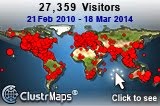I just read Miguel Guhlin's post The Undiscussables of Tech Leadership (as well as a few other thought-provoking blog posts from his blog, Around the Corner).
I've worked (hard) for 20 years to be the best educator I can be. do my best to understand, both in an academic sense and in a pragmatic, experiential way, what that even means.
Part of me believes that it's all perspective. Being a tech leader (or now, just a leader having taken out "edtech" from the title since it's all just "ed" in 2012, right?) at a small school I go back and forth from positive to negative, frustration to optimism. In no particular order and not tech-related, here are a few things that I just do not get-
-Why do some teachers firmly believe that textbooks and teacher's guides are a necessity in order to "cover all the material?"
-We do we think covering material means learning has occurred?
-Are we too obsessed with technology, gadgets and devices?
-Why are so many children given spelling lists and words to memorize?
-Will we ever agree on what makes a good school or a good teacher?
Saturday, December 15, 2012
Friday, December 14, 2012
Innovative Culture at Google
 |
| Image Credit:Nina Matthews Photography |
Of course, I am an outside observer, and I've only observed a scratch of the surface. But certain things stand out.
•Positivity- Everyone I met is brimming over with enthusiasm and excitement for what they do. They don't like working here; they love it. They feel privileged to be here. As Patrick Pichette, Google's CFO said when he spoke to our group, "Life is short; you have the right to whistle to work."
 •Humanness- In contrast to many teachers, people who work at Google can go to the bathroom whenever they want. Not only that, the bathrooms are quite nice (with heated toilet seats).
•Humanness- In contrast to many teachers, people who work at Google can go to the bathroom whenever they want. Not only that, the bathrooms are quite nice (with heated toilet seats).The food is great, plentiful and free. Google supplies workers with free transportation, counseling, recreation, pet-sitting assistance, massages, haircuts, and the list goes on and on. In other words, they recognize that people work best when they are not stressed about other matters. They want people at their best so that they can shine.
•The Gift of Time- Google is famous for 20% time. Engineers at Google are given 20% of their work time to pursue whatever interests them, the idea being that our brains need time and space to explore, learn and expand. It is that expansion and freedom that births new ideas. Many teachers and schools are taking note and experimenting with giving students 20% time to explore their interests and pursue personal projects.
•Passion to make a difference in the world- Everyone wants to feel like what they do matters. It is a mindset, not necessarily tied to any industry or line of work. The people I met at Google were passionate about using their energies to make a difference in the world. According to Pichette, Google is 3 things- a search engine, a for-profit (and wildly successful) company, and a university-type environment. The financial success is necessary in order to create the university-type environment and the university environment is necessary to nurture the innovative ideas that in turn creates more financial success. But I got the feeling that the true motivation was making the world a better place and the money was the by-product of that, as well as the enabler of continued growth.
•The world IS Broken!- I don't know how many times I've declared, "If it's not broke..." According to Pichette, at Google they view the world as broken and go about finding pragmatic ways to fix it. This speaks strongly to me, as I (like so many people) am resistant to change. I get comfortable (stuck!) with things being the way they are and fail to imagine new possibilities.
•Be Yourself- What I didn't see at Google, was people watching the clock. I saw no mass exodus to the parking lot at 5 pm. I did see guests joining their working friends and family for meals. I saw people playing volleyball and bowling in the bowling alley. I glimpsed the dance studio and other fun places to take a break from thinking, writing, coding or whatever they happen to do. Hmmmm.... makes me think of the saying of one of my student-teaching mentors (about students), "They're here because they're alive!"
•Share- Google is all about open access to information. Yes, we had to sign a non-disclosure agreement that extended to photography of non-public spaces. However, every lead-learner and presenter said something to the effect of, "Feel free to use my materials." The unspoken corollary to that is, "go ahead and remix, create something better and then share that." This is how the web is changing the world and pushing us to "dream more, learn more, do more, become more."
•Don't Lose the Forest for the Trees- (or just "save the trees!") I have written before about my fear that a lack of concern for environmental sustainability is the dark side of edtech. Of course, it IS California (where the general vibe is so much more in tune) but I, personally, appreciated the evident respect for reducing and recycling. No earth= no tech.
So, which of these ideas can schools apply in our quests to be innovative learning environments?
Subscribe to:
Posts (Atom)






